Serendip is an independent site partnering with faculty at multiple colleges and universities around the world. Happy exploring!
Beyond History
| science itself will teach man... that he himself is something of the nature of a piano-key or the stop of an organ... so that everything he does is not done by his willing it, but is done of itself, by the laws of nature....even if this were proved to him by natural science and mathematics, even then he would not become reasonable, but would purposely do something perverse out of simple ingratitude, simply to gain his point.... the whole work of man really seems to consist in nothing but proving to himself every minute that he is a man and not a piano-key! .... Fyodor Dotoevsky, Notes From Underground, 1864 |
I do see myself as a piano key, constantly being played upon by forces outside my control. The question is, if we still get to enjoy the wonder of this world, if we are still capable of creating beautiful things, does it matter? ... eglaser
In biology, psychology, and other sciences we are taught ... that so many aspects of our lives are controlled ... The only variable that could lead us to believe in free will is our thought. However, the more that I learn about the biological role in thought and action, the more I find myself accepting my existence as a "piano key." .... especk01
Even though it makes sense for humans to be predetermined by genes and culture, it just don’t feel right ... eolecki
I got to thinking about why many people are so afraid of the possibility of not having a special place on this planet. So what if we are all not created with a purpose? Is this a bad thing? I think it just gives us a broader variety of things to pursue in life. If anything would it increase free-will? ... aybala50
I think its important to encourage people to, as William James put it, "believe in free will" so as to make it a greater part of all of our lives ... Paul Grobstein (and because its important for how we approach culture, including literature)
A story beyond piano keys (and beyond foundational narrativity?) ....
Step 1. The relation between evolution as a non-foundational narrative story and science
| Linear science | Seriously loopy, story teling science |
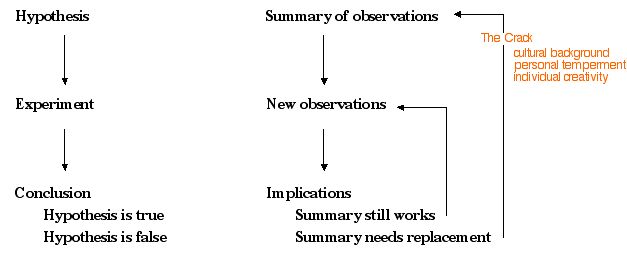
|
|
| Science as successive approximations to Truth
Non-narrative? |
Science as ongoing story telling and story revision: repeated making of observations, interpreting and summarizing observations, making new observations, making new summaries ... individually and collectively Science as skepticism, a style of inquiry that can be used for anything, one which everybody is equipped to to/can get better at/be further empowered by, and contribute to - a way of making sense of what is but even more of exploring what might yet be Narrative? (see The Nature of Science) |
Looking elsewhere for selves and cultures ...
Finding selves and cultures (plus) within evolution = emergence
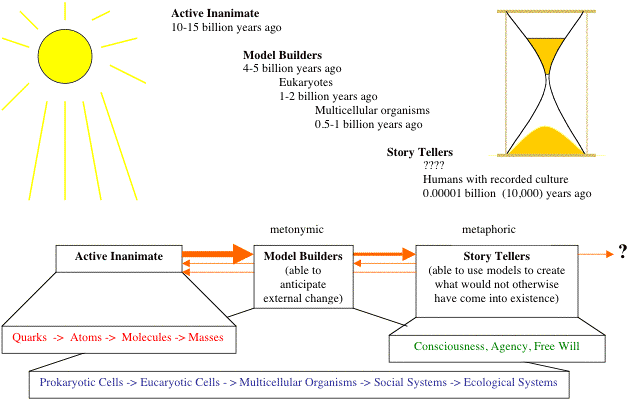
Individuals and cultures (including meaning, intention, esthetics) were not present at the beginning, don't exist in some different parallel world (foundationalism, but also don't disappear, ...
They are instead themselves outcomes of an evolutionary process based in randomness and,
once having come into being,
they in turn become causal influences in that process, using randomness. Therefore there is more than history.
Humans share with all other living organisms the wherewithal to explore forms of life, creating new ones, not fully explained by history, in the process
and can do so as well though story telling
The story telling brain as a new development in evolution (a new form that in turn ...)
 |
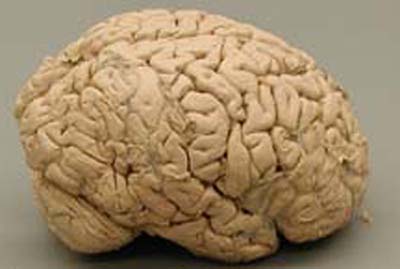 |
 |
Neocortex gives us the capacity to tell stories, to go beyond experiences, to conceive/explore/bring into existence new worlds, to create meaning using randomness and out of randomness
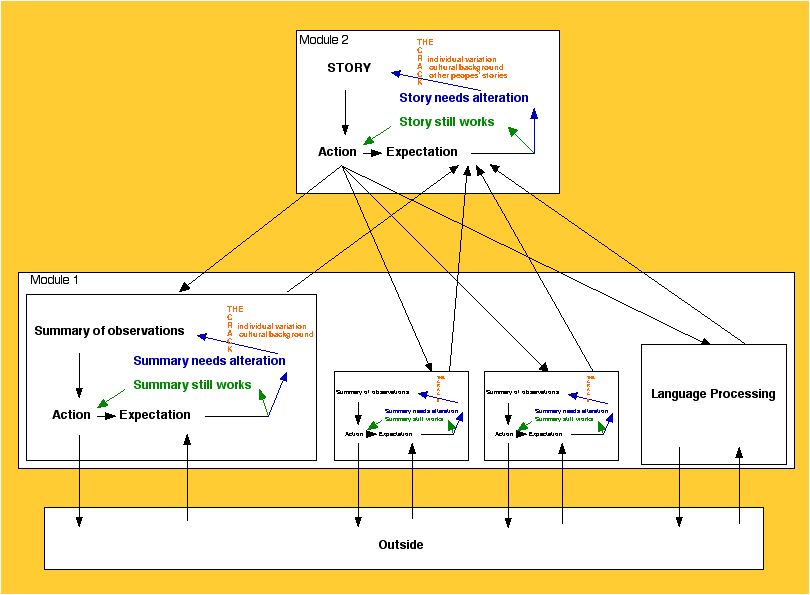
An unconscious AND a conscious "crack", with randomness playing a role in both
Both self and culture can influence story which in turn can influence unconscious
Conscious crack an accelerator of evolutionary exploration
Creates not only form but meaning and esthetics, personality responsibility, free will
There CAN be new things under the sun
 Dennett's skyhooks are anchored in .... another more fixed, permanent, eternal world; his attack is on such other worlds, not actually on skyhooks per se
Dennett's skyhooks are anchored in .... another more fixed, permanent, eternal world; his attack is on such other worlds, not actually on skyhooks per se
Brain is a skyhook anchored in .... the brain; the brain is a crane but is capable of conceiving things that are not fully accounted for by history and acting to try and create them; it is therefore also a skyhook
Biological evolution does "explain" either individuals or cultures. Both have properties that are allowed but not determined by biological evolution. Perhaps though it is worth recognizing that both individuals and cultures derive from biological evolution, and so would be expected to display some of its properties.
- Heritability, history-dependence
- Non-essential categories
- Differential persistance dependent on context
- Influence of randomness
- Persistant exploration of novel possibilities
Individual/cultural evolution rooted in but not determined by biological evolution. There is in addition individual/cultural creativity through additional randomness (brain's skyhook abilities). The overall pattern is one of exploring what might be be ("novel possibilities"). Beyond history ... the task of the second half of course?
Some samples ...
"biological systems predominantly have "vertical" transmission of genetically-ensconced information (meaning parents to offspring) ... the neatness of evolutionary trees in general in biological systems stems from the compartmentalisation of information within historical lineages ... Not so in material cultural systems-where horizontal transfer is rife-and arguably the more important dynamic. Makers copy each other ... Thus, instead of neatly bifurcating trees, you would predict to find what is best described as "networks"-consisting of an historical signal of what came before what, obscured often to the point of undetectability by this lateral transfer of subsequent ideas.
In material cultural systems, where lateral exchange among designs ... is rife, and where human inventiveness always lurks to change the system, we also find astonishing stability/conservatism-more than one might have predicted. But here there are no genetic constraints, no boundaries to the system, responsible for stasis in design ... Accidental copying mistakes that lead to something useful have no doubt occurred ... And ... all sorts of ideas undoubtedly pop up, often unbidden, and perhaps not all at the conscious level, in the creative mind-many to be instantly discarded, but perhaps some to be kept and eventually incorporated into new designs: a more compelling analogy to biological mutation. But much more prevalent is "directed variation"-the deliberate production of variant designs."
"the reality of divergence pervades the history of life, defining its morphospace - its space of forms ... as an intrinsically expanding one ... if language evolves by diverging, why not literature too? ... divergence prepares the ground for convergence, which unleashes further divergence; this seems to be the typical pattern ... a materialist conception of form ... opening new conceptual possibilities seemed more important ..."
Paul Feyerabend: Implications for thinking about the cultural institution of science
"The idea that science can, and should, be run according to fixed and universal rules, is both unrealistic and pernicious. It is unrealistic, for it takes too simple a view of the talents of man and of the circumstances which encourage, or cause, their development. And it is pernicious, for the attempt to enforce the rules is bound to increase our professional qualifications at the expense of our humanity. In addition, the idea is detrimental to science, for it neglects the complex physical and historical conditions which influence scientific change. It makes our science less adaptable and more dogmatic: every methodological rule is associated with cosmological assumptions, so that using the rule we take it for granted that the assumptions are correct.
... we arrive at the result that the separation of science and non-science is not only artificial but also detrimental to the advancement of knowledge. If we want to understand nature, if we want to master our physical surroundings, then we must use all ideas, all methods, and not 'just a small selection of them.
... let us free society from the strangling hold of an ideologically petrified science just as our ancestors freed us from the strangling hold of the One True Religion!
A mature citizen is not a man who has been instructed in a special ideology, such as Puritanism, or critical rationalism, and who now carries this ideology with him like a mental tumour, a mature citizen is a person who has learned how to make up his mind and who has then decided in favour of what he thinks suits him best. He is a person who has a certain mental toughness (he does not fall for the first ideological street singer he happens to meet) and who is therefore able consciously to choose the business that seems to be most attractive to him rather than being swallowed by it."
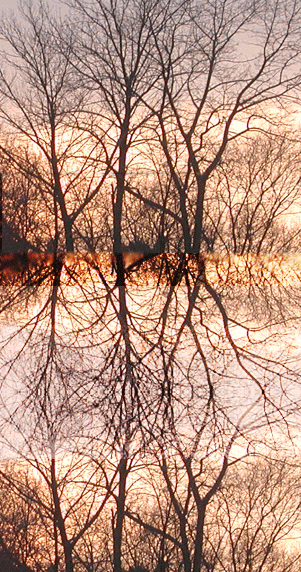 Take history seriously, in order to get beyond it? To appreciate piano keys and become more than one? To appreciate the role of biological evolution in culture (including literature) and the additional features it has?
Take history seriously, in order to get beyond it? To appreciate piano keys and become more than one? To appreciate the role of biological evolution in culture (including literature) and the additional features it has?
The deeper we seem to delve into each new phrase or interesting metaphor that describes our current topic, the farther we get away from the original meaning posed by the initial word. Are our words evolving in this hour-and-a-half class? ... Hilary McGowan
I think the confusion comes in when we split off into two groups and our terms begin to evolve separately (into two varieties or species?) and then we come back together ... kbrandall
Let's continue evolving ...




Comments
Post new comment